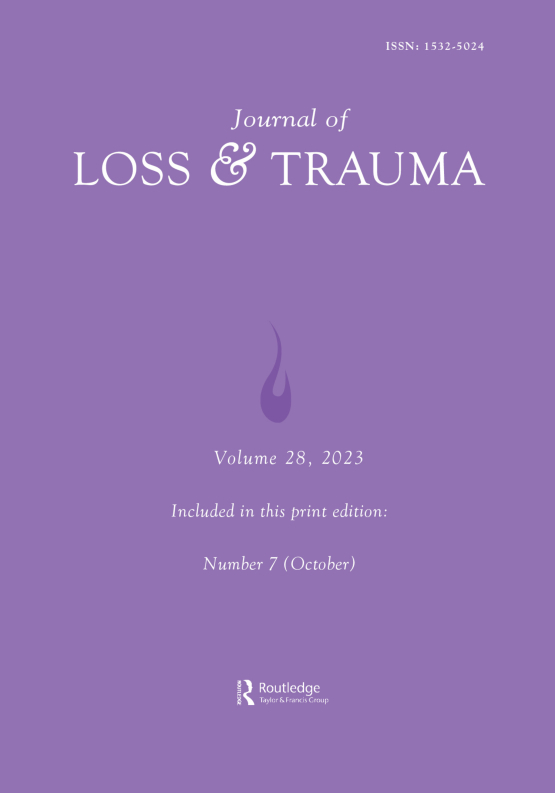Submit a Manuscript to the Journal
Journal of Loss and Trauma
For a Special Issue on
Living Under the Shadow of Political Violence, Surviving Mass Killing and Massacre Events
Manuscript deadline
28 February 2025

Special Issue Editor(s)
Professor Limor Goldner,
School of Creative Arts Therapies, Faculty of Welfare and Health Sciences, University of Haifa
[email protected]
Prof. Rachel Lev-Wiesel,
School of Creative Arts Therapies, Faculty of Welfare and Health Sciences, University of Haifa
Living Under the Shadow of Political Violence, Surviving Mass Killing and Massacre Events
The aims of the special issue are as follows:
- To investigate the lived experience and coping strategies of living under political violence, surviving mass killing and massacre events.
- To investigate the role of the community in mitigating the loss and trauma among individuals.
- To broaden the knowledge of biological-physiological-emotional aspects of war-related loss and trauma across ages.
- To explore the usefulness of creative intervention and art-based techniques in mitigating loss and trauma across regions, gender, and developmental phases.
Motivations
Millions of children and adults have been maimed, displaced, orphaned, and killed in modern warfare that targets civilian populations. For instance, on February 24, 2022, Russia initiated a full-scale invasion of Ukraine. According to the Ukrainian government, since the onset of the conflict, at least two thousand civilians have lost their lives, and essential social infrastructure such as schools and kindergartens has been destroyed in the process. The High Commissioner for Human Rights reports that 250,000 children are regularly subjected to bombing, shelling, and exposure to landmines and unexploded remnants of war. Notable incidents include the bombing of a children's hospital and maternity ward in Mariupol, as well as mass killings in the Donbas and Bucha. Likewise, the massacre in Israel on October 7, 2023, commenced with a barrage of over 3,000 rockets launched against the country, alongside incursions into its territory by vehicle-transported and powered paragliders. Hamas fighters (around 3,000 thousand) breached the Gaza–Israel barrier, killing civilians in neighboring Israeli communities, burning houses with alive civilians inside, beheaded babies' heads in front of their parents, and raping. In a single day, 859 Israeli civilians and at least 348 Israeli soldiers and policemen were killed in nearby towns, kibbutzim, military bases, and at the NOVA music festival. Around 250 Israeli civilians and soldiers were taken as hostages in the Gaza Strip, of which the number of kidnapped children was about 40.
Prior data indicates that these events resulted in PTSD, depressive symptoms, behavioral and emotional issues, sleep disturbances, and psychosomatic symptoms in both adults and children. However, further information is needed to comprehend the profound short- and long-term impacts of these devastating experiences from the perspective of the survivors themselves. Additionally, more research is necessary to enhance our understanding of survivors' coping mechanisms and the development of theoretical models, as well as innovative treatment protocols, to address such traumatic events. This can be achieved through empirical quantitative and qualitative studies, as well as case studies.
The topics include, but are not limited to:
- War-related loss
- War-related trauma
- Political violence, post-conflict setting-loss, mass killing and massacre events
- Practices and resilience related to political violence, surviving mass killing and massacre events
- Gender-based violence as a political mean
- survival and coping strategies employed at war-time
- Coping with war-related bereavement loss and trauma
- War-related stress, anxiety and depression
- Creative intervention practices for positive mental health
- Creative techniques and wellbeing
- Theoretical overviews of biological and psychological aspects in coping with war-related loss and trauma
Looking to Publish your Research?
Find out how to publish your research open access with Taylor & Francis Group.
Choose open accessSubmission Instructions
Prospective authors may follow the author guidelines of Journal of Loss and Trauma.
- Articles should be written with the following elements in the following order: title page; abstract; keywords; main text introduction, materials and methods, results, discussion; acknowledgments; declaration of interest statement; references; appendices (as appropriate); table(s) with caption(s) (on individual pages); figures; figure captions (as a list)
- Should contain an unstructured abstract of 250 words.
- Should contain no more than 5 keywords. Read making your article more discoverable, including information on choosing a title and search engine optimization.
Timelines
Submission dates : March 1, 2024 to February 28, 2025
Review process : On a rolling basis from March 2024 to April 2025
Publication : Volume 30 Issue 6 or 7